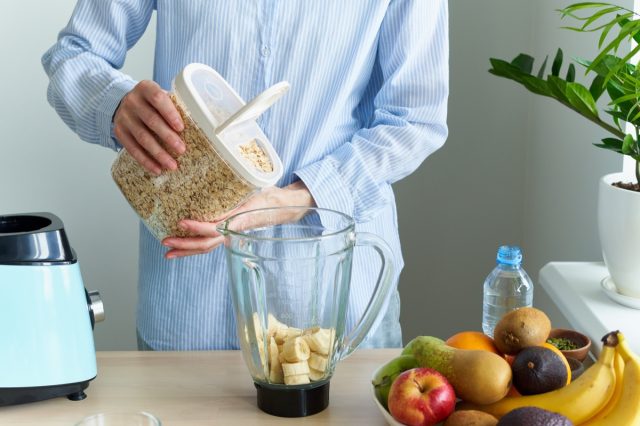If you currently have high cholesterol or are concerned about possibly being at risk of developing this condition, chances are you’ve already spoken to healthcare professionals about the importance of cholesterol management and gotten tips for keeping it at healthy levels. Although hearing their advice is one thing, understanding how to best take proactive action in your everyday life can be quite another. Along with exercise, watching what you consume—even down to your choice of drink—plays an important role in effectively regulating your cholesterol. Consciously tuning in to what you put in your body and the frequency at which you eat or drink can mitigate the possibility of increasing the amount of “bad” cholesterol in your blood vessels.
Though being mindful of what you eat may seem like an obvious solution, what you drink should not be considered an afterthought. The beverages you have each day present opportunities to ensure you’re putting the proper nutrients into your body to stay healthy. This is why, according to Lauren Manaker MS, RDN, LDN, CLEC, CPT, and author of The First Time Mom’s Pregnancy Cookbook, The 7 Ingredient Healthy Pregnancy Cookbook, and Fueling Male Fertility, the most crucial drinking habit for high cholesterol is making sure you consume fruits and vegetables in your beverages.
“There are many drinks that may help lower LDL ‘bad’ cholesterol or increase HDL ‘good’ cholesterol, especially if they are a part of an overall heart-healthy diet,” Manaker told Eat This, Not That! “Some varieties of fruit juices may offer heart-health benefits.”
How drinking fruits and vegetables can impact cholesterol


Manaker also points out that “several clinical studies report significant decreases in total cholesterol and LDL cholesterol in adults who consumed orange juice [concentrate]. Some data has shown an increase in HDL cholesterol when 100% OJ is consumed, as well.”
“Other juices, like cranberry juice, may offer heart health benefits as well,” Manaker continues. Cranberries are enriched with vitamins and minerals that support your body’s antioxidant system and heart health. This, in turn, can potentially benefit your cholesterol levels, according to the American Heart Association.
However, juices aren’t the only way to drink your fruits or veggies. Smoothies are also a fun, healthy way to introduce any blend of ingredients boasting cholesterol-managing advantages into your daily routine.
“Having a smoothie made with fruits and vegetables will give your body a variety of nutrients that may help support healthy cholesterol levels,” Manaker says. “A smoothie not only includes important vitamins and minerals, but it also allows for some fiber, which may lower cholesterol levels, as well.”
READ RELATED: 4 Best Gluten Free Crackers To Buy, Say Dietitians
Soluble fiber—aka dietary fiber—reportedly minimizes the amount of LDL that can be absorbed into your bloodstream, according to the Mayo Clinic. Additionally, the Mayo Clinic claims that having a minimum of five to 10 grams of soluble fiber each day can help reduce your LDL cholesterol. What makes smoothies so versatile is that there are plenty of fruits and vegetables that are high in fiber to choose from, like apples, pears, berries, pomegranates, broccoli, carrots, sweet potatoes, and oranges. With all these options, your palate will never get bored!
Do’s and don’ts to keep in mind


While fruits and vegetables are optimal picks for a smoothie, you’ll also want to make sure you’re adding other ingredients that can further benefit your health, as opposed to having the opposite effect.
“It is important to avoid including large quantities of added sugars when making your heart-healthy smoothie,” says Manaker.
According to the Cleveland Clinic, high-sugar diets can reportedly “make your liver synthesize more ‘bad’ LDL (low-density lipoprotein) cholesterol” while also reducing your ‘good’ HDL cholesterol and increasing your blood fats, particularly your triglycerides. Meanwhile, incorporating other healthy ingredients like oats into your smoothies will not only enhance the taste and texture of your concoctions but can also support healthy cholesterol levels.
“Including some oats in your smoothie can give your body a boost of beta-glucan, a unique fiber that may help lower cholesterol levels,” says Manaker.
A bonus crucial drinking habit to consider
While drinking certain juices and smoothies can positively contribute to cholesterol maintenance, you do not have to limit yourself to only these beverages when minding your cholesterol. Manaker suggests that certain teas can also help support healthy cholesterol.
“True teas may help keep blood cholesterol levels healthy, as well. Green tea is one true tea that is known to be a source of catechins, which may play a significant role in lowering LDL cholesterol,” she says. “People can make a habit of including true teas in their diets every single day. In fact, some data suggests having even more than one cup of this drink a day is needed to offer heart health benefits.”
Kayla Garritano
Source:










